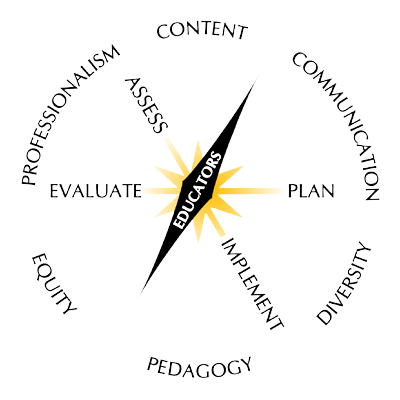Conceptual Framework for Teacher Preparation
 Educators as guides for engaged learners summarizes the conceptual framework for UNT’s basic and advanced programs. This concept is portrayed visually as a compass, which represents the tools educators employ as they orient students in the exploration of landscapes for learning. The engagement of learners requires simultaneous commitment to academic knowledge bases and to learner-centered practice. The orientation of engaged learners requires commitment to the continuous processes of assessment, planning, implementation, and evaluation that characterize discovery, problem solving, curriculum development, program development, inquiry, and research. Guiding engaged learners features on-going dialogue between educators and their students and with wider communities about how schools can prepare students for life-long learning in a democracy.
Educators as guides for engaged learners summarizes the conceptual framework for UNT’s basic and advanced programs. This concept is portrayed visually as a compass, which represents the tools educators employ as they orient students in the exploration of landscapes for learning. The engagement of learners requires simultaneous commitment to academic knowledge bases and to learner-centered practice. The orientation of engaged learners requires commitment to the continuous processes of assessment, planning, implementation, and evaluation that characterize discovery, problem solving, curriculum development, program development, inquiry, and research. Guiding engaged learners features on-going dialogue between educators and their students and with wider communities about how schools can prepare students for life-long learning in a democracy.
Guiding engaged learners draws on six areas of competence developed in all UNT programs for educators.
- Content and curricular knowledge refers to the grounding of educators in content knowledge and knowledge construction and in making meaningful to learners the content of the P-16 curriculum.
- Pedagogical knowledge of teaching and assessment refers to the ability of educators to assess, plan, implement, and evaluate teaching and learning in terms of its consistent engagement of learners.
- Promotion of equity for all learners refers to the skills and attitudes that enable educators to advocate for all students within the framework of the school program.
- Encouragement of diversity refers to the ability of educators to appreciate, affirm, and engage the various cultural heritages, unique endowments, learning styles, interests, and needs of learners.
- Professional communication refers to effective interpersonal and professional oral and written communication that includes appropriate applications of information technology.
- Engaged professional learning refers to the commitment of educators to ethical and caring practice and to continued learning and professional development.
